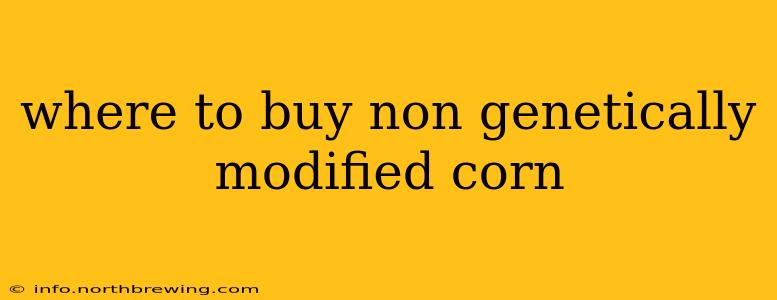Finding non-genetically modified (non-GMO) corn can be easier than you think, though it requires a bit more diligence than grabbing a standard bag from the supermarket. The widespread adoption of GMO corn in conventional agriculture means actively seeking out non-GMO options is key. This guide will help you navigate the options and find sources for your needs, whether you're buying for personal use or larger quantities.
What Types of Non-GMO Corn Are Available?
Before we dive into where to buy it, it's helpful to understand the varieties available. You'll primarily encounter two types:
-
Sweet Corn: This is the type most people think of when they hear "corn." It's the juicy, sugary corn you eat on the cob or use in salads and other dishes. Non-GMO sweet corn is widely available during its growing season at farmers' markets and some grocery stores.
-
Field Corn: This is a tougher, starchier type of corn primarily used for animal feed, cornmeal, corn syrup, and other processed products. Finding non-GMO field corn for direct consumption is less common, but it can be sourced from specialized suppliers or farms. If you're looking for non-GMO cornmeal or other processed products, look for labels clearly stating "non-GMO."
Where Can I Buy Non-GMO Corn?
Locating non-GMO corn depends on the quantity you need and the type of corn you're after. Here are several avenues to explore:
1. Farmers' Markets and Local Farms
This is often the best place to find fresh, non-GMO sweet corn during its growing season (typically summer and early fall). Talk directly to farmers; they can tell you about their growing practices and confirm whether their corn is GMO-free. The advantage here is the freshness and the direct connection with the producer.
2. Grocery Stores
Larger grocery chains are increasingly carrying non-GMO products. Look for labels clearly stating "non-GMO Project Verified." This certification signifies that the product has met rigorous standards for non-GMO content. However, selection might be limited, particularly for field corn. Check specialty sections or organic produce aisles.
3. Health Food Stores and Co-ops
Health food stores and co-ops often have a wider selection of non-GMO products than conventional supermarkets. They are more likely to carry non-GMO cornmeal, flour, and other processed goods made from non-GMO corn.
4. Online Retailers
Several online retailers specialize in selling non-GMO foods, including corn. This is a good option if you can't find what you need locally, but be aware of shipping costs and potential freshness concerns.
5. Seed Suppliers
If you're looking to grow your own non-GMO corn, many seed suppliers offer non-GMO varieties. This ensures you have complete control over the corn's origin and growing process.
Frequently Asked Questions (FAQs)
How can I be sure the corn I'm buying is truly non-GMO?
Look for reputable certifications like the "Non-GMO Project Verified" seal. This means the product has been independently verified to meet strict standards. Talking directly to the farmer or producer is another reliable way to confirm the corn's origin and growing methods.
Is non-GMO corn more expensive than GMO corn?
Generally, yes. The demand for non-GMO corn is higher than for conventional GMO corn, making it a more expensive option. The extra cost reflects the higher production costs and the stricter standards involved in non-GMO farming.
What are the benefits of choosing non-GMO corn?
Many consumers choose non-GMO corn due to concerns about potential health and environmental impacts of GMOs. While the scientific debate on the long-term effects of GMOs continues, choosing non-GMO corn is a personal preference based on these concerns.
Where can I find non-GMO corn for large-scale purchases?
For large-scale purchases, you'll likely need to contact agricultural suppliers or wholesalers specializing in non-GMO products. These suppliers can provide the quantities needed for larger-scale applications, such as animal feed or industrial processing.
By following these tips and exploring the different avenues available, you should be able to find non-GMO corn that meets your needs and preferences. Remember to always check labels and ask questions to ensure you're making informed choices.
